By Shari Rudavsky: Indianapolis Star, December 25, 2022
The abandoned bridge over the river in southern Indiana near Edinburgh beckoned to the group of kayakers in the water below.
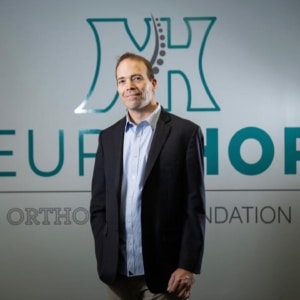
Chris Leeuw is the Founder and Executive Director of NeuroHope.
Photo: Jenna Watson/IndyStar
Chris Leeuw and his friends secured their boats, scaled the structure, and poised to dive into the cool water below. Flying through the air, Leeuw did not notice the man next to him who had jumped off the bridge nanoseconds after his own feet left the ground. When Leeuw hit the water, the stranger landed atop his head, snapping his neck and instantly changing his life irrevocably. The man, whose name Leeuw does not know to this day, dragged him to shore, saving his life. But Leeuw, who never lost consciousness, could feel nothing.
“It was literally like a light switch,” he said. “I was just totally paralyzed from the neck down.”
After Leeuw was airlifted to IU Health Methodist for emergency surgery, his doctors said he’d never walk again, but he defied those predictions after spending months in a Utah specialty rehabilitation clinic. His success in Utah inspired him to open a mirror of that program here in Indianapolis, helping others with injuries similar to his own.
Unlike conventional rehab that cease when insurance payments stop, Leeuw’s NeuroHope clinic focuses on long-term recovery, stepping in to help patients who have exhausted their physical therapy allotments. To help pay for the costly service, Leeuw fundraises tirelessly to keep his self-pay fees reasonable.
NeuroHope, the rehabilitation center he opened on the northeast side, recently received a $1 million OrthoIndy Foundation grant. The money will allow the 5-year-old center expand further, serve more patients and fill a void of longterm therapy for people with spinal cord or brain injuries or who have suffered strokes.
Leeuw and his program have been on the radar of the OrthoIndy Foundation since 2016 when Leeuw approached the Foundation for assistance. “Blown away” by Leeuw’s accomplishments, the Foundation initially committed $36,000 to the program. When OrthoIndy started thinking about making another major grant along the lines of the $3 million it gave to help build the Pike Township YMCA in 2016, NeuroHope topped the list.
Indiana has no other program like NeuroHope, which is one of just 11 community fitness and wellness centers around the world that belong to the Christopher Reeve Foundation’s Neuro-Recovery Network. Many insurance programs provide physical therapy for only a set amount of time; Leeuw’s own experience as well as those of many of the NeuroHope clients attest to the value of continuing to work on recovery, his fans at OrthoIndy say.
“Chris’s program demonstrates that there are more opportunities for rehabilitation, but you have to stay at it for a long time,” said John Ryan, OrthoIndy CEO. “What it affords our doctors to do … is to offer up that there are solutions that will extend beyond what they might otherwise receive.”
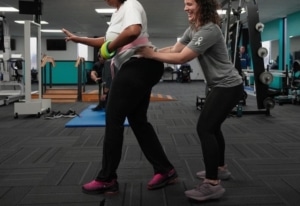
Lydia Miner (right) a PTA, works with Tranicia Hankins at NeuroHope. The center offers long-term physical therapy and a fitness space for people with neurologic injuries. Hankins had a stroke six years ago and is training to walk again. Photo: Jenna Watson/IndyStar
Drop by NeuroHope on any weekday and you’ll see a range of activity. Some patients work one-on-one with physical or occupational therapists, honing their balance or improving their walking skills in other ways. Others work on upper- body strength, building back up muscles that have atrophied.
In one room, NeuroHope’s wellness coordinator Kendal Baker stands in the midst of a circle of men on machines, some on recumbent bikes, others on machines that work out their arms instead of their legs. The class has a spin class feel as Baker exhorts the men to move faster, raise their heart rate and watches the effect on a screen in front.
Outside the class in the main Tranicia Hankins, 41, walks a careful line under the watchful eyes of a staff member. The Noblesville resident, who had a stroke six years ago, came to NeuroHope after rehabbing elsewhere.
Since Hankins started at NeuroHope, her mother has noticed that she’s more stable when she walks and has more endurance. Now, Hankins hopes that one day she may walk without a cane. Watching Leeuw around the gym has proved an inspiration, Hankins said, “just to see him doing it every day.”
Coming back from the accident
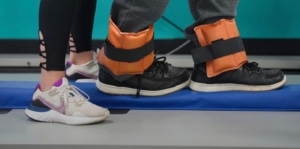
Megan Lashley (left) a neurorecovery exercise specialist, works with a client for balance training at NeuroHope.
Photo: Jenna Watson / IndyStar
But Leeuw cautions that his story of recovery is just that — his own — and that each person travels his or her own recovery path, depending on multiple factors such as the severity of their accident.
Reaching this point, however, was as long a journey for Leeuw as for his clients.
Almost instantly after his accident, which abruptly ended the kayaking excursion with friends, Leeuw knew he was paralyzed. He was airlifted to IU Health Methodist Hospital and rushed into emergency surgery.
Despite what doctors feared, about a week after his accident, Leeuw, who was in peak shape, moved a muscle in his inner thigh.
“That was a little small glimmer of hope,” he said. “But the recovery process is so long. … And the journey is a mental journey just as much as a physical one.”
At the time of the accident, Leeuw worked for ChaCha, the search engine started by multimillionaire Scott Jones. But recovery became a full-time job. He had to learn how to navigate his life, how to feed himself, how to bathe, how to use a power wheelchair.
Statistics suggest that those with spinal cord injuries eventually plateau in their recovery so Leeuw knew that all too soon the intensive therapy to which he had access in those early months after the accident would come to an end. After a stint at the Rehabilitation Hospital of Indiana, Leeuw moved to a nursing home, where he continued to recover ever so slowly.
While in the nursing home, he even achieved the milestone of standing again, putting weight on his legs. Although just a few months earlier, he had thought he might never stand again, this achievement proved only small solace for him.
“It was kind of hard to celebrate some of those early wins because you still wanted more,” he said.
His former boss Jones told him about a clinic near Salt Lake City, opened by a doctor who himself had recovered from a spinal cord injury and learned to walk again. Leeuw fundraised enough to relocate to Utah with his mother.
Housed in a space far smaller than Leeuw’s own current facility, Neuroworx featured state-of-the-art equipment and operated on the philosophy that people like Leeuw need longerterm care than insurance covers to maximize recovery. For three hours a day five days a week, Leeuw said, he concentrated on regaining as many of his abilities as possible.
After about two years Leeuw could walk again and care for himself again, although his left side continues to have some level of paralysis. The final step for him involved being able to drive on his own. After therapy each day, he and his mother would visit a student driving course near their apartment and Leeuw would take the wheel of the car, which was outfitted with a special knob.
“I would always keep trying to get my right arm strong enough to turn the wheel, and I’d fail and fail and fail,” he said. “Then when I finally was able to do that, that was time to go home.”
More of the care they need
As Leeuw drove himself back east to Indiana, he brought with him a vision: An Indianapolis clinic in Indianapolis that replicated the one in Utah.
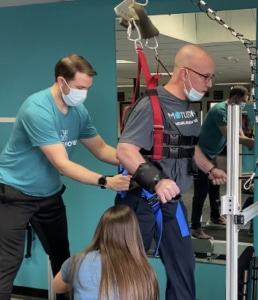
Elliot Cohee, PT, DPT (left) is the Director of Therapy at NeuroHope and oversees clinical operations. Here he works with Brad Spencer in a gait training exercise.
From his own experience, Leeuw knew health insurance often does not cover such care. Most insurance plans only cover 22 to 28 therapy visits a year, far from sufficient for people recovering from catastrophic accidents.
At first Leeuw partnered with the University of Indianapolis, which gave him free space in a small room in Fountain Square. He opened NeuroHope in 2015 with little but a therapy mat and a dream.
Soon, however, Leeuw fundraised about $100,000 to purchase an electrical stimulation machine that improves strength and coordination by using electrical current pulses to stimulate muscle contractions. He secured additional donated equipment, such as a standing frame for those who use wheelchairs to practice standing.
Although NeuroHope had only parttime hours, patients flocked to the doors, through word of mouth. Two years ago the Indiana Spinal Cord and Brain Injury Research Fund gave the clinic a two-year grant of close to $1 million, opening the door for the clinic to expand. In 2017 NeuroHope moved to its current home adjoining the fitness center of what was then Incrediplex. The new space allowed Leeuw to realize his dream of a hybrid facility that’s part physical therapy clinic, part fitness center.
“That’s what we do that’s so unique … We see people in different, different places in their recovery,” Leeuw said. “We merge the two because we recognize these injuries take a long time to recover from.”
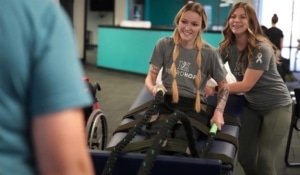
Brittanie Howe (right) a physical therapist, leads Olivia Garrison in a core-strengthening exercise at NeuroHope
About 30% of people with spinal cord injuries are sedentary, never leaving their wheelchairs and about 30% are hospitalized every year for issues like skin breakdown, pressure sores, or cardiovascular trouble, Leeuw said. Keeping this population healthy, then, not only improves individual health but can also saves on hospital costs.
For some, insurance covers their physical therapy; others pay out of pocket for services. To help defray costs and make it possible to offer patients in need care, Leeuw fundraises full time, which sets his facility apart from others that rely on insurers for payment.
At the time of the move, the clinic had about half a dozen employees and served about 25 people. Today the staff has nearly tripled in size for about 95 clients, Leeuw said. While most of the patients come from central Indiana, some travel from out of state. Although some may not have had exposure to some of the machines that NeuroHope offers, for most the clinic’s philosophy rather than its technology proves the draw.
“A majority of the time people have gotten the care they needed. It’s just they need more of it,” said Elliot Cohee, director of therapy. “A lot of our philosophy is just getting people out of their chair … and just trying to get them to use as much as their strength and their body that they can to help with the recovery.”
While Leeuw realizes that his own story may serve as a beacon to others that they, too, can come back from devastating injuries, he also stresses that as he see it, his success lies not in the fact he tried harder or did more therapy. Instead, he said, his injury was not as severe as those others have endured — and he did two years of intense work to relearn how to walk and use his arms.
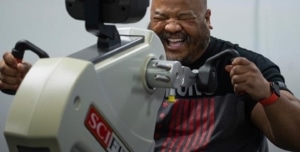
Binh Dennis works out in a group cardio class at NeuroHope. Photo: Jenna Watson / IndyStar
Leeuw and his staff shy away from answering the question so many clients ask, When will I walk again? Each person, they know, is different; each injury poses its own challenges.
After a motorcycle accident in 2018, Binh Dennis, 52, eventually found his way to NeuroHope, looking for a place that would help him continue to regain as much of his past life as possible from his wheelchair.
Formerly a Fishers police officer, when Dennis was discharged from the hospital, he could only transfer himself from his wheelchair to a hospital bed. Now he can go from his chair to any sitting surface, shower independently, dress himself.
Three times a week, Dennis comes to NeuroHope, where he takes cardio classes, strength training classes, and works on increasing his abilities.
“I have come to accept the fact that my injury is permanent. What I look forward to is continuing maintaining my independence,” Dennis said. “The biggest thing I have gained is mental strength. Nothing is impossible.”
Contact IndyStar reporter Shari Rudavsky on email at shari.rudavsky@indystar.com. Follow her on Twitter @srudavsky.











 THANK YOU to our hole sponsors: Conquer Paralysis Now, Delta Faucet Company, Goodman Campbell Brain and Spine, Kona Jacks / Daddy Jacks, Bardstown Bourbon, Hanger Clinic, Prevail Prosthetics & Orthotics, Burger King of Kokomo, Muncie & Southport, VanLehman CPA & Advisory Firm, Helgeson Steel, National Seating & Mobility, Sunrise Medical, Valparaiso University, McGowan Insurance Group and Auto-Owners Insurance, BraunAbility, The George Insurance Agency, Sparenberg Farms, Compass Construction Group, Byram Healthcare, DIH, HC1, Lannie Thompson of F.C. Tucker Company, Tim and Chris Lawson, and Elliot and Dorothy Cohee.
THANK YOU to our hole sponsors: Conquer Paralysis Now, Delta Faucet Company, Goodman Campbell Brain and Spine, Kona Jacks / Daddy Jacks, Bardstown Bourbon, Hanger Clinic, Prevail Prosthetics & Orthotics, Burger King of Kokomo, Muncie & Southport, VanLehman CPA & Advisory Firm, Helgeson Steel, National Seating & Mobility, Sunrise Medical, Valparaiso University, McGowan Insurance Group and Auto-Owners Insurance, BraunAbility, The George Insurance Agency, Sparenberg Farms, Compass Construction Group, Byram Healthcare, DIH, HC1, Lannie Thompson of F.C. Tucker Company, Tim and Chris Lawson, and Elliot and Dorothy Cohee.









